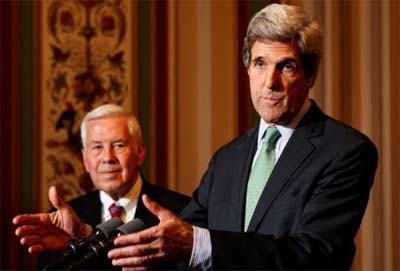The 2008 February elections – almost two years ago – did raise such hopes among many. However, since then there have been a series of political, economic and security setbacks which have jolted the nation and have seriously undermined its faith in the democratic process, as presently articulated by the two major political parties who, notwithstanding their promise to let bygones be bygones, continue to excel each other in political mud-slinging.
From the judicial crisis to the Kerry-Lugar bill – with the intervening episodes of mishandling of the atta, sugar and cement crises, the unwarranted cases against the Sharif brothers, the procrastinated Army action in Swat, the artificial controversies over the IDP issue, the minus one formula and the theatrics of Brigadier Imtiaz Billa and other spymasters – the two parties have left no stone unturned to malign and score points against each other. The frequent television debates between their protagonists have bordered on the ugly and the ludicrous.
If the leaderships of the two parties had shown some semblance of maturity and shrewdness, not necessarily of statesmanship, they would have prevented the political class from the odious reputation that currently haunts them. However, they have been involved too deeply in blame-trading about the past and retaining or recapturing the power in the present, rather than in making a concerted effort to solve the challenges facing the nation in the future. Finger-pointing for corruption and mismanagement against those in power are countered with charges of destabilization and mid-term election manipulation, on behalf of those running the government. The Parliament has lost its efficacy as a forum of serious debate on matters of substance and consequence, and has become a place for grandstanding by and vulgar exchanges between rival political factions, as evidenced by the symbolic suspension of the membership of two parliamentarians by the deputy speaker.
Having just recovered from a prolonged period of military rule, which both parties have been victims of and have vowed to block its re-emergence in the future, it is distressing to see that both sides are still playing cat and mouse with the military and remain ambivalent about the latter’s role in politics (courting it when it suits their ends and rebuffing it when it doesn’t). The incidents relating to a retired brigadier’s appearance on television channels and giving salience to his and his ilk’s brazen interference in politics, as well as the recent attempt (‘in the darkness of the night’) to deliberately drag the military into the debate on Kerry-Lugar bill, amply illustrate this unfortunate trend.
The debate on the Kerry-Lugar bill, both in the Parliament and in the media, has been inane and has skirted the main issues, which remain under-stressed. As the Urdu proverb goes, while the elephant has been swallowed with ease, its tail has stuck in the throat. If fuss had to be made – and some was needed, if for no other reason but to remind the Americans that, despite being a dysfunctional state, Pakistan could not be equated or hyphenated with Karzai’s Afghanistan – it should have been on the quantum of the aid and the reason for seeking it, not simply on the manner it was being doled out. Beggars may not be choosers, but the wronged have the right to be recompensed for material losses, not merely for wounded egos of the elites.
Although there is no denying that the war that is presently (though not during Musharraf’s regime) being fought by Pakistan against the Taliban and Al-Qaeda terrorists is its own and is not being undertaken solely at the behest of the west, the collateral damage that Pakistan has suffered in the past (conservatively estimated at $35 billion) has been immense. Pakistan could have asked the US and its allies to compensate it for this loss, in addition to the cost of the logistical support that Pakistan is providing to the allied forces fighting in Afghanistan. The promised US aid of $7.5 billion over 5 years is ‘peanuts’ compared to what is needed to eradicate and keep the threat of terrorism at bay (much less eradicate poverty and illiteracy). If the US really wanted to enter into an ‘extended partnership’ and/or wished to ‘win the hearts and minds’ of Pakistanis, as well as Afghanis, it would have launched a Marshall Plan-type of reconstruction effort in the region, instead of carrying out the ‘shock and awe’ and ‘surge’ waves in Iraq and Afghanistan, which had its spill-over effects on Pakistan. Despite his best intentions, President Obama remains a prisoner of the past and the vested interest lobbies to be able to take such bold initiatives.
Given the present state of both global and domestic uncertainty, the acceptance or rejection of the aid package contained in the Kerry-Lugar bill, which has already been signed by President Obama, is hardly likely to make a significant difference to the continuing political stalemate, economic stagnation and social disaffection in Pakistan. It addresses only the tip of the iceberg of the problems the country finds itself submerged in today, if one were to ignore the political hullabaloo of the naysayers and the hoopla of its fervent (‘more loyal than the king‘) supporters.
The wave of terrorist attacks on major Pakistani cities which began with the breach of the elaborate protective arrangements for the WFP building in Islamabad and the GHQ in Rawalpindi and is continuing unabated should serve as a reminder that this is no time for debating non-issues and that the serious challenges confronting the country can’t be deferred any longer.
S.M. Naseem is former Director of the Development and Planning Division, UN-ESCAP.
An adapted version of this article appeared on 17 October in Dawn, Karachi.

